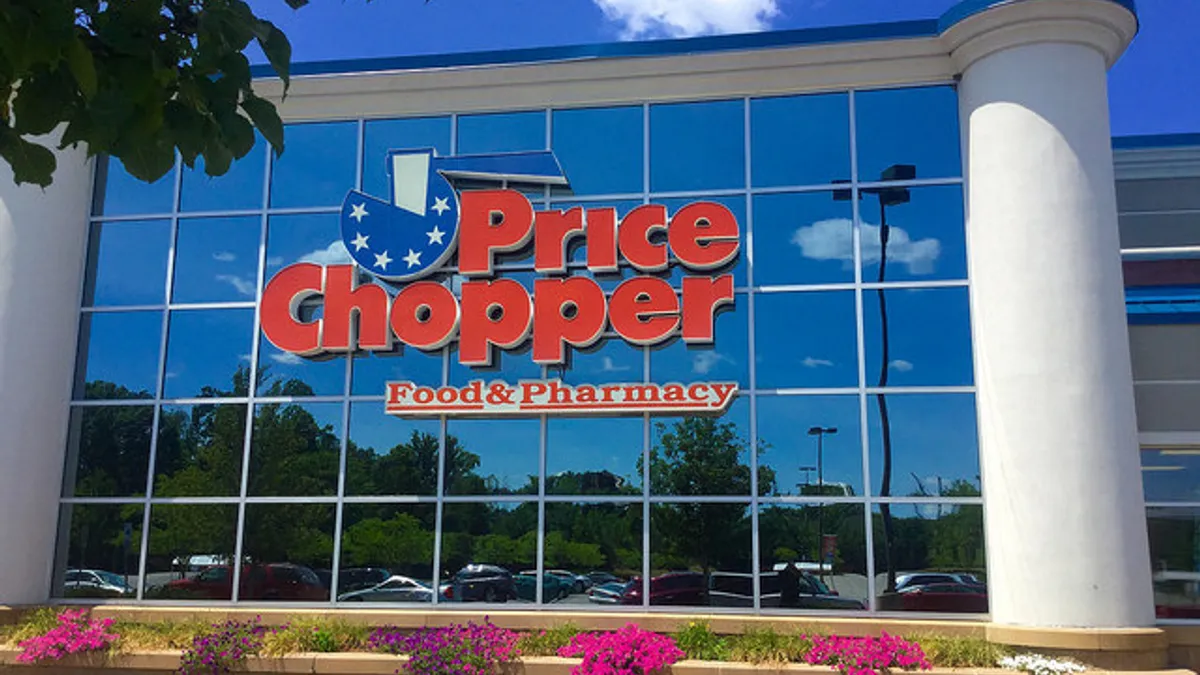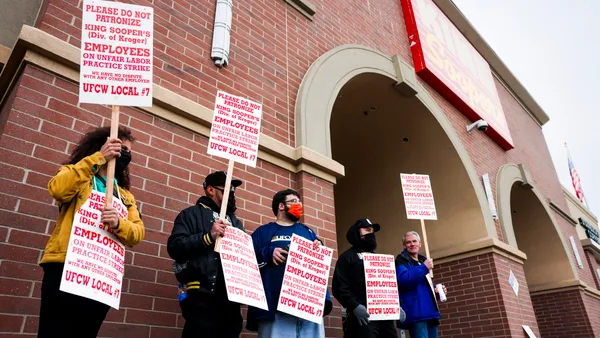Dive Brief:
- Price Chopper/Market 32 and Tops Markets have agreed to merge in a transaction that will combine the two privately held regional supermarket chains into a single company with nearly 300 grocery stores in six Northeastern states, the companies announced Monday morning. Financial terms of the deal were not disclosed.
- The newly formed company will have more than 30,000 employees and operate stores under the Price Chopper, Market 32, Market Bistro and Tops Markets banners in Connecticut, Pennsylvania, New York, Vermont, Massachusetts and New Hampshire. Scott Grimmett, president and CEO of Price Chopper/Market 32, will serve as chief executive of the new company and serve on its board, while Tops Markets Chairman and CEO Frank Curci will assume a board seat and act as a consultant in the transition.
- The union is poised to help two grocers that have both been in business since the 1920s build economies of scale and expand their footprints as they look to compete with much larger national chains.
Dive Insight:
Buoyed by recent demand and seeking an edge in a relentlessly competitive Northeast market, Price Chopper and Tops have decided to band together.
The merger joins two storied regional grocery chains that share many of the same markets, not to mention a narrative of decades-long growth followed by a recent struggle to keep pace with industry change. Tops recently went through Chapter 11 bankruptcy while Price Chopper has been seeking financial assistance to help it stay afloat. Both chains have updated stores and invested in secondary formats, with mixed success.
"I've seen tremendous change in our industry across my 65-year career and have long been an advocate for the promise of innovation and partnership, like that which has driven this merger forward," Neil Golub, Price Chopper/Market 32's executive chairman of the board, said in a statement.
Grimmett, who will oversee the newly formed company, became Price Chopper’s president in 2016 after spending 38 years working for Safeway. He was the first company leader not related to the Golub family, which founded Price Chopper in 1932.
"This merger marks a major step forward and collectively elevates our ability to compete on every level," said Grimmett. "It leverages increased value for our customers; advances shared opportunities for innovation; fortifies the depth of our workforce, community and trade partnerships; and ultimately accelerates our capacity to deliver a distinctively modern and convenient shopping experience."
Price Chopper appears to have been seeking a deal for some time. Albertsons reportedly tried to buy the company several years ago. In 2019, Golub told a luncheon crowd that “in order for us to grow in this business, we need to have a partner.” He also said at the time that the grocer was “committed to the long haul.”
Tops, which operates most of its stores in New York state and also has locations in Pennsylvania and Vermont, restructured its finances in its 2018 bankruptcy stint, offloading much of the debt former owners had piled into it. Since then, the company has focused on updating its stores with enhanced fresh departments and new services like in-store coffee shops.
Curci, Tops’ Markets chairman and CEO, will step into the role of board member and consultant nearly eight years after acquiring Tops from investment firm Morgan Stanley along with a group of senior managers.
"We have long believed that this merger makes sense both strategically and based on the similar ways in which we each put customers first, go to market and treat our people," Curci said in a statement.
Both chains have invested in alternative formats. Price Chopper began converting legacy stores to the more upmarket Market 32 format in 2015, in part to compete with regional powerhouse Wegmans. The company also operates one Market Bistro location, which focuses on prepared foods, in Latham, New York.
Tops, meanwhile, opened specialty market Orchard Fresh in 2013 but never scaled past a single location. That store closed last spring.
Tops and Price Chopper hope to combine what they’ve learned over the years and also achieve greater economies of scale to compete against the likes of Wegmans, Walmart, Aldi and Stop & Shop.
“It is ever more critical for regional grocers to build the scale required to enable them to also invest in price, people, marketing, technology and growth (albeit far less given their relative size)," PJ Solomon, the investment bank that is serving as the financial consultant and chief arranger of financing for the new company, said in a statement. "This transaction is a clear reflection of that imperative.”














